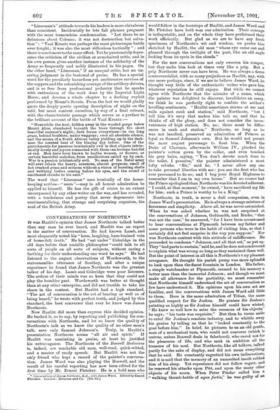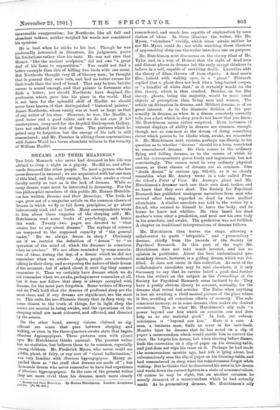CONVERSATIONS OF NORTHCOTE.*
IT was Hazlitt's opinion that James Northcote talked better than any man he ever heard, and Hazlitt was an expert in the matter of conversation. He had known Lamb, and most eloquently noted his "keen, laughing, hare-brained vein of home-felt truth." He had "sat under" Coleridge in the old days before that amiable philosopher "could talk to all sorts of people on all sorts of subjects, without caring a farthing for their understanding one word he says." He had listened to the august observations of Wordsworth, to the statesmanlike utterance of Southey, and after a unique experience he found that James Northcote was the greatest talker of his day. Lamb and Coleridge were poor listeners. The ardour of their minds was so keen that they could not play the humbler part. Wordsworth was better at thought than at any other enterprise, and did not trouble to take his share in the contest. But Hazlitt had a high standard. "The art of conversation is the art of hearing as well as of being heard," he wrote with perfect truth, and judged by this standard, the best converser that ever he knew was James Northcote.
Now Hazlitt did more than express this decided opinion. He backed it, so to say, by reporting and publishing his con- versations with Northcote, and let us know the quail ty of Northcote's talk as we know the quality of no other man's talk, save only Samuel Johnson's. Truly, in Hazlitt's presentation Northcote seems "all air and spirit" If Hazlitt was unstinting in praise, at least he justified his extravagance. The Northcote of the Boswell Redivivus is, indeed, are markable old man, well-read, quick-witted, and a master of ready speech. But Hazlitt was not the only friend who kept a record of the painter's conversa- tion. James Ward was also playing the Boswell, and the result of his careful reporting has now been edited for the first time by Mr. Ernest Fletcher. He is a bold man who • Conversations of James Northage, ILA., with James Ward. Edited byEnnest Fletcher. London: Methuen and Co. [10e. ed.] would follow in the footsteps of Hazlitt, and James Ward and Mr. Fletcher have both won our admiration. Their courage is indisputable, and on the whole they have performed their work efficiently. But glad as we are to have any fresh specimens of Northeote's wit and wisdom, we prefer him sketched by Hazlitt, the old man "whose eye came out and glanced through the twilight of the past, like an old eagle looking from its eyrie in the clouds."
For the new conversations not only sweeten his temper, but they make him look at times very like a prig. But a prig Northeote never can have been. He was always a fierce controversialist, with as many prejudices as Hazlitt, nay, with one more perhaps, since, if we are to believe James Ward, he thought very little of the enthusiastic writer who gave him whatever reputation he still enjoys. But while we cannot agree with Northcote that the mistake of a name, which the painter was delighted to -discover, invalidates an essay, we think he was perfectly right to confute the author's levelling sentiments. " Hazlitt sometimes storms at me and rails against rank and station," said Northcote, "but I tell him it's envy that makes him talk so, and that he thinks of all the glory, and does not consider the incon- veniences of high station. No, no ; there must be differ- ences in rank and station." Northcote, so long as he was not insulted, preserved an admiration of Princes as loyal as Samuel Johnson's own. But he would not permit the most august personage to flout him. When the Duke of Clarence, afterwards William IV., plucked the painter's cotton gown by the collar, and even touched his grey hairs, saying, "You don't devote much time to. the toilet, I perceive," the painter administered a most lofty rebuke. "Sir," said he, "I never allow any one to take personal liberties with me : you are the first who has ever presumed to do so; and I beg your Royal Highness to, remember that I am in my own house." But no sooner had the Prince apologised than Northcote was his devoted adherent. " I could, at that moment," he owned, " have sacrificed my life for him; such a Prince is worthy to be a King."
Northcote, in truth, is never dull companion, even in James Ward's presentation. He is always a strange mixture of fierceness and simplicity. Above all, he was never astonished. When he was asked whether he was not surprised at the conversations of Johnson, Goldsmith, and Burke, "that was not the case," he answered, "for I have been accustomed to hear conversations at Plymouth between my father and some persons who were in the habit of visiting him, so that I certainly did not feel surprise in the way you suppose." Nor was Northcote content with this attitude of indifference. He proceeded to condemn "Johnson, and all that set," as put up. They " had parts to sustain," said he, and he does not condescend. to explain what was wrong so long as they sustained them well,. But the point of interest in all this is Northcote's vary pleasant arrogance. He thought his parish pump was more splendid to look upon than the finest fountain in London. His father, a simple watchmaker at Plymouth, seemed to his memory a better man than the immortal Johnson; and though we must make all allowance for the partiality, we must remember that Northcote himself understood the art of conversation as few have understood it. His opinions upon his own art are familiar, and the conversations with James Ward add little to them. Here is the same admiration of Titian, the same qualified respect for Sir Joshua. He praises Sir Joshua's painting as highly as Sir Joshua himself could have wished. "He knew so well how to seize the essences of his objects," he says ; "his taste was exquisite." But then he turns aside to extol Sir Joshua's resolute industry, and to whittle away his genius by telling us that he "looked constantly to the goal before him." In brief, he pictures to us an old gentle.. man of a mechanical turn, who could not converse (which is untrue, unless Boswell deals in falsehood), who cared not for the pleasures of life, and who sank in ambition all the treasure of his soul. But Northcote, like all talkers, talked partly for the sake of display, and did not mean everything that he said. He constantly regretted his own indiscretions, and it is said that the memory of an unmerited insult robbed him of his sleep. Yet repentance did not follow regret, and he renewed his attacks upon Pitt, and upon the many other objects of his scorn. When Peter Pinder called him a "walking thumb-bottle of aqua fortis," he was guilty of an
-inexcusable exaggeration ; for Northcote, like all full and abundant talkers, neither weighed his words nor considered his opinions.
He is best when he sticks to his last. Though he was profoundly interested in literature, his judgments prove his limitations rather than his taste. He was not sure that Homer, "like the ancient sculptors," did not owe "a great .deal of his fame to superstition." You could not find a better example than this of killing two birds with one stone. But Northcote thought very ill of literary men; he thought that in general they were vain, and had no better excuse for their trade than the need of bread. That may be true, but the excuse is sound enough, and that painter is fortunate who finds a better; nor should Northcote have despised the profession which gave him his place in the world. Had it not been for the splendid skill of Hazlitt we should never have known of that distinguished "historical painter," James Northcote, whose vanity was at least as large as that of any writer of his time. However, he was, like Hazlitt, a good hater and a good talker, and we do not care if his masterpieces, composed for the Boydell Shakespeare Gallery, have not endured the test of time. The pictures which he prized may be forgotten, but the energy of his talk is still remembered ; and Mr. Fletcher in editing these conversations with James Ward has borne abundant witness to the veracity of William Hazlitt.











































 Previous page
Previous page